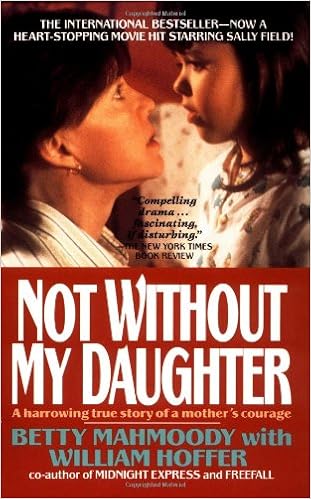 No matter my view of the world, a gripping story of international intrigue, raw, primordial bravery, faith, and patriotism, is told by Betty Mahmoody and William Hoffer in Not without My Daughter (ISBN: 0-312-92588-3), a memoir of Mahmoody's experiences when her husband took her and their daughter to Iran and then forcibly kept them there. Mahmoody starts with her flight to Iran from America's heartland, where she spent her entire life and moved from her blue-collar beginnings to entertaining and comfort of the upper middle class thanks to her Iranian husband. She had various reasons for agreeing on the flight to Iran, but staying there indefinitely wasn't one of them. That such a plan is her husband's plan is apparent within a week of arrival, and it's made worse by the fact that most of his family, and like most eastern cultures, family connections are extensive, is in on the kidnapping. Mahmoody and her kindergarten-age daughter, Mahtob, endure the next two years under what amounts to house arrest in an unfamiliar and usually hostile foreign land where hatred for America is not only the official line, but something many citizens openly and actively agree with. Eventually, Mahmoody is able to make contacts with various people, some simple shopkeepers, some foreign government officials, and others who are just the universal kind-hearted person you always hope exists out there. She uses these contacts to organize a treacherous escape for her and her daughter, and through a few minor miracles, they are smuggled to freedom.
No matter my view of the world, a gripping story of international intrigue, raw, primordial bravery, faith, and patriotism, is told by Betty Mahmoody and William Hoffer in Not without My Daughter (ISBN: 0-312-92588-3), a memoir of Mahmoody's experiences when her husband took her and their daughter to Iran and then forcibly kept them there. Mahmoody starts with her flight to Iran from America's heartland, where she spent her entire life and moved from her blue-collar beginnings to entertaining and comfort of the upper middle class thanks to her Iranian husband. She had various reasons for agreeing on the flight to Iran, but staying there indefinitely wasn't one of them. That such a plan is her husband's plan is apparent within a week of arrival, and it's made worse by the fact that most of his family, and like most eastern cultures, family connections are extensive, is in on the kidnapping. Mahmoody and her kindergarten-age daughter, Mahtob, endure the next two years under what amounts to house arrest in an unfamiliar and usually hostile foreign land where hatred for America is not only the official line, but something many citizens openly and actively agree with. Eventually, Mahmoody is able to make contacts with various people, some simple shopkeepers, some foreign government officials, and others who are just the universal kind-hearted person you always hope exists out there. She uses these contacts to organize a treacherous escape for her and her daughter, and through a few minor miracles, they are smuggled to freedom.I vaguely remembered hearing about this or a similar case at some point in the news, so when I had the opportunity to read this book, the opportunity seemed very interesting. The book didn't disappoint. The bottom line is that the story is a good one — it's an enjoyable book. I was appreciative of some other aspects of the book, too, though. I was appreciative of the authors' descriptions of the big city, the lively markets, and sights, sounds, and smells. I was intrigued by Mahmoody's return to the faith of her childhood even as she came to better understand and appreciate the faith of those around her, including those causing so much grief and pain in her life. Unlike some critics, who have claimed Mahmoody's description of Iran and Iranians is calloused and even racist or bigoted, I found nothing of the sort in the book. First of all, she wasn't trying to paint a picture of all Iranians or the whole country; she was writing a memoir, which by its very definition, describes her — and only her — thoughts and experiences. Second, she pointed out that there were many kind and generous people in her life while in Iran, including those in her husband's family that she came to respect and to a certain extent, love. Finally, I appreciated the patriotism. Mahmoody is one who has experienced other cultures and other lands. While the circumstances obviously bias her, she was remarkably even-handed in describing the things she saw and experienced. Through all that, though, she came to appreciate her homeland, the USA, even more than ever before because of the real freedoms that we do have and others, sadly, often do not.
| | This work, including all text, photographs, and other original work, is licensed under a Creative Commons Attribution Non-Commercial No Derivatives 3.0 License and is copyrighted © MMXI John Pruess. |
No comments:
Post a Comment